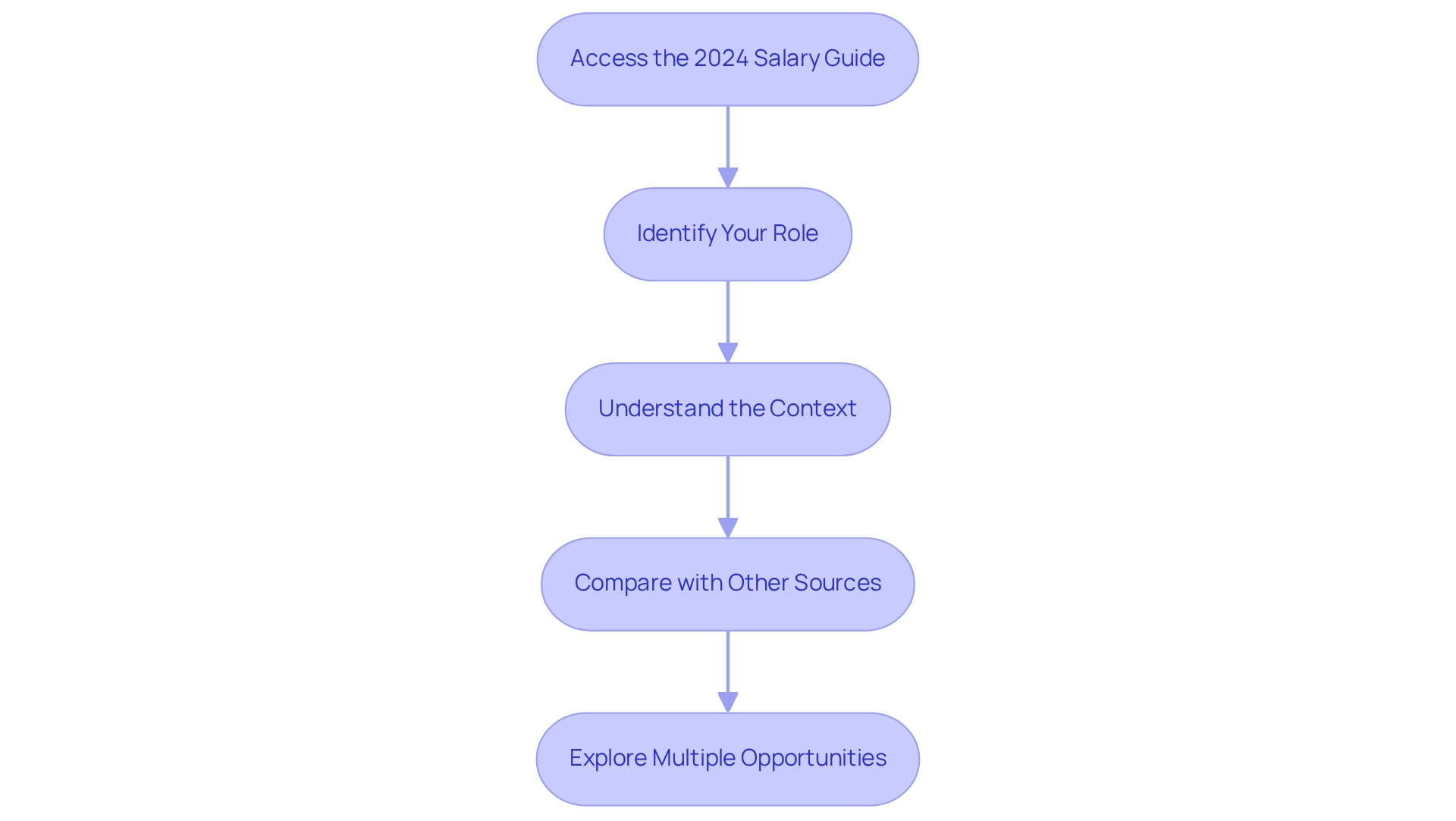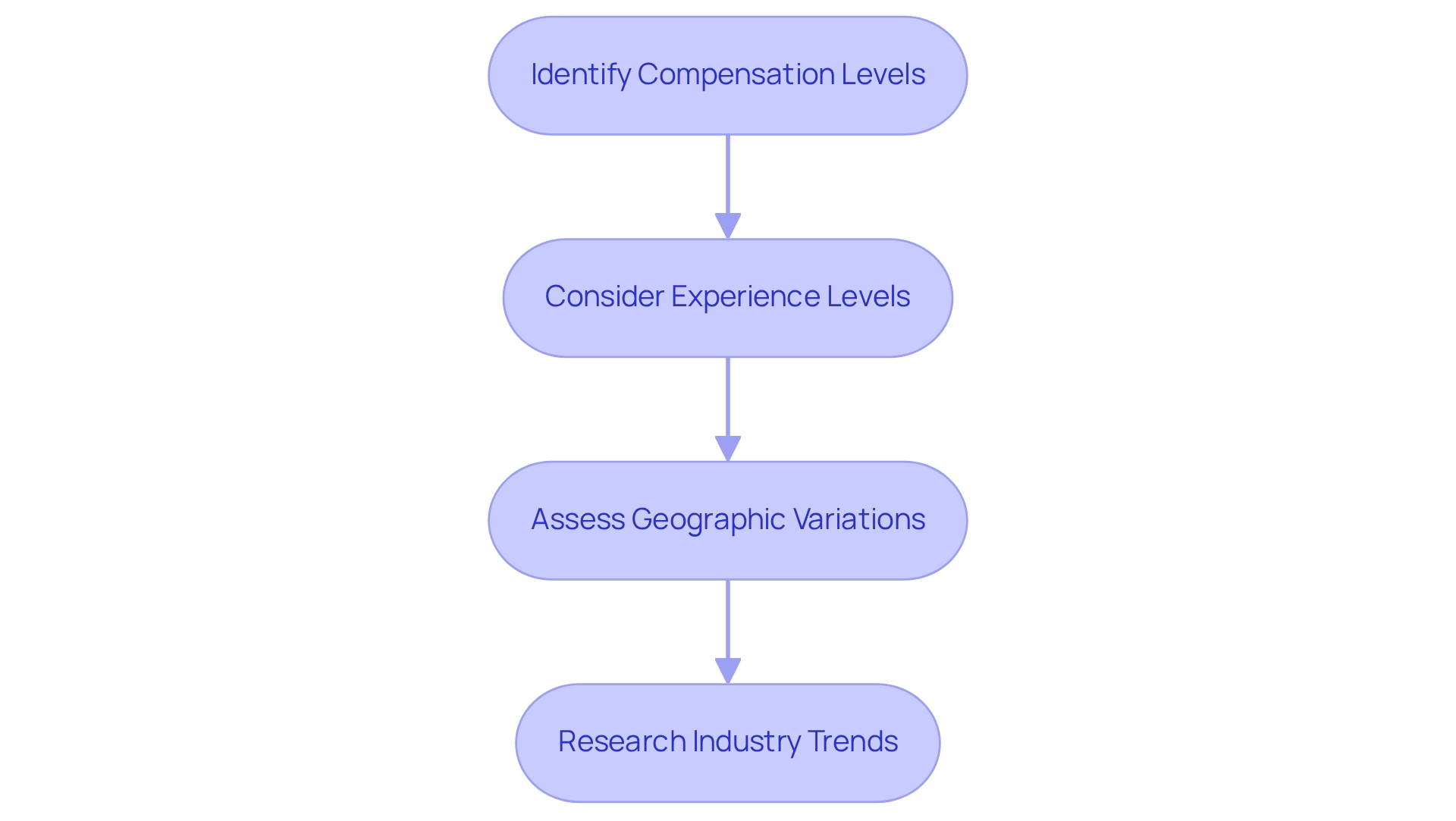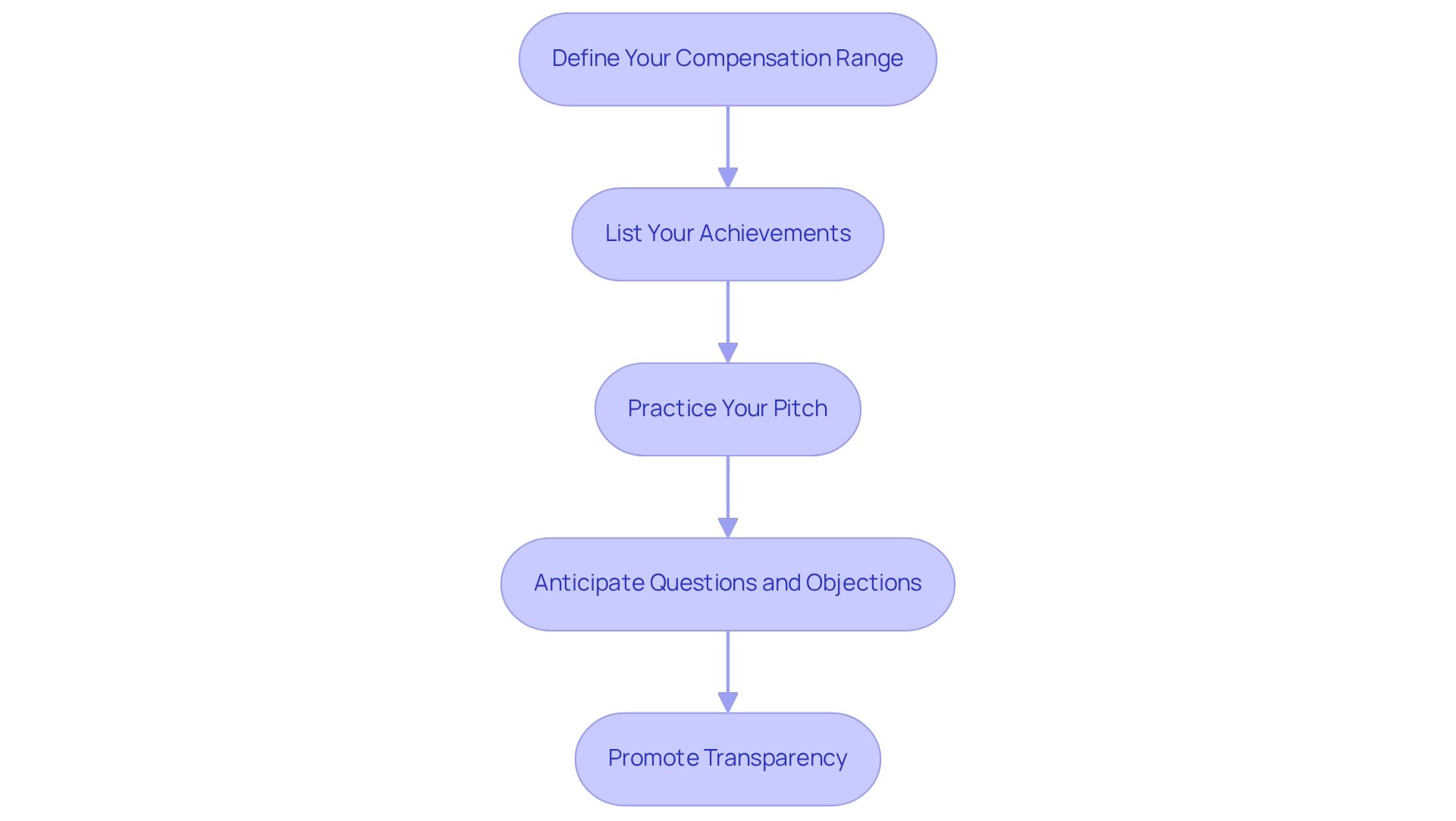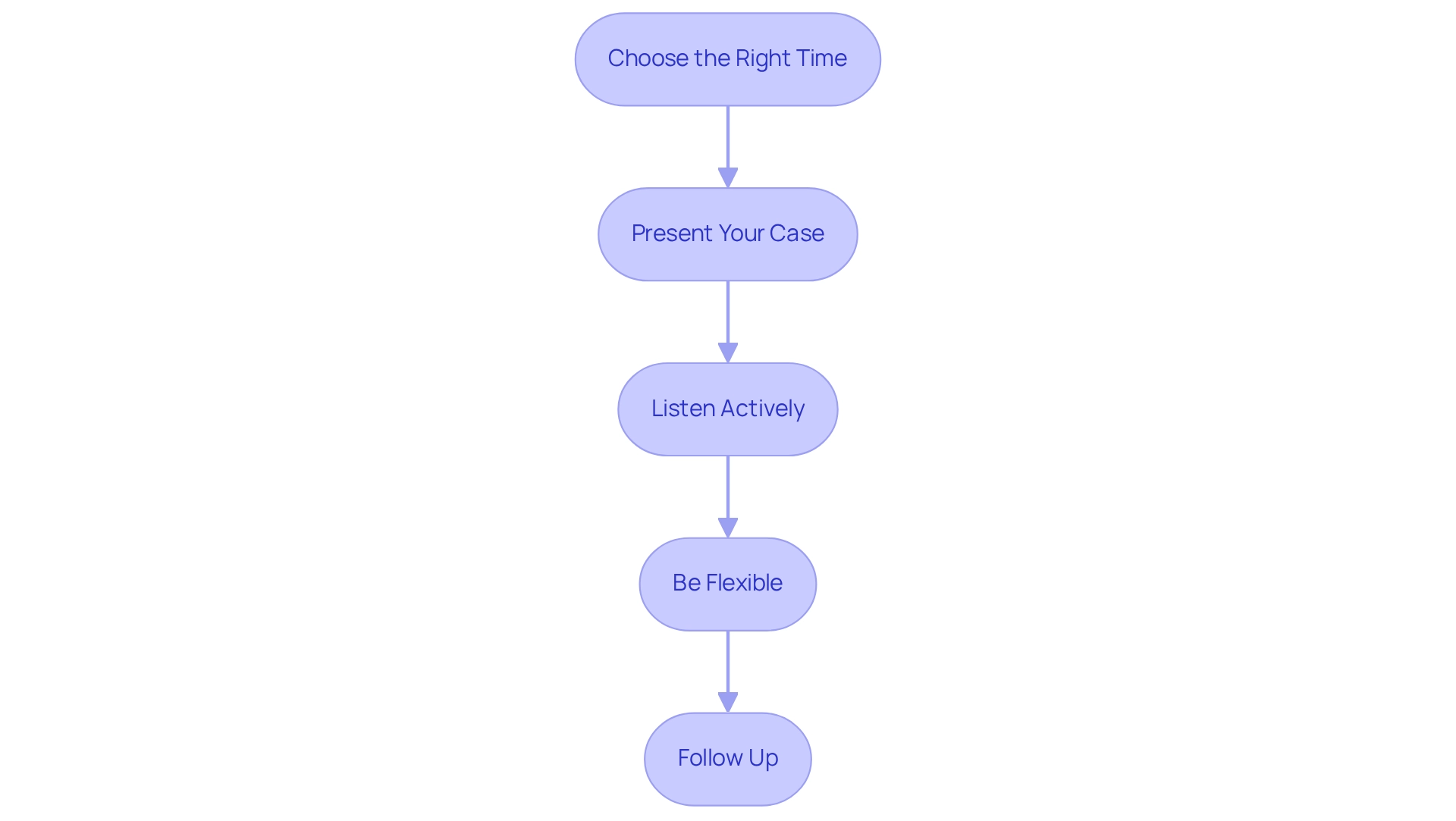Overview
The article centers on mastering the 2024 salary guide, a crucial tool for enhancing negotiation strategies in effective compensation discussions. It underscores the significance of comprehending pay scales, meticulously analyzing personal qualifications against industry standards, and preparing exhaustively for negotiations. These elements collectively empower individuals to advocate confidently for their worth, ultimately securing favorable compensation packages.
Key Highlights:
- Familiarize yourself with the 2024 salary guide to understand pay scales across industries.
- Identify your specific job title and analyze the compensation range based on experience and location.
- Consider economic factors like inflation and industry trends that may influence salary expectations.
- Cross-reference compensation data with multiple sources for accuracy and a broader perspective.
- Explore various job offers to make informed decisions aligned with long-term career goals.
- Define a realistic compensation range based on the salary guide and your qualifications.
- Compile a list of achievements to showcase your value during negotiations.
- Practice your negotiation pitch and anticipate employer questions to maintain confidence.
- Choose the right timing for salary discussions, ideally after a job offer or during performance reviews.
- Present your case confidently, supported by research and your contributions.
- Engage in active listening to understand the employer’s perspective and show flexibility in negotiations.
- Follow up with a thank-you email to reinforce professionalism and maintain communication.
Introduction
Navigating salary negotiations can often feel like a daunting task, particularly in today’s competitive job market. However, with the release of the 2024 Salary Guide, professionals now have access to a wealth of data that empowers them to negotiate effectively. This guide outlines salary ranges across various industries and provides insights into hiring trends and the economic factors influencing compensation.
By understanding how to leverage this resource, individuals can position themselves confidently in salary discussions, ensuring they advocate for a compensation package that truly reflects their value. As the employment landscape evolves, mastering the art of negotiation becomes essential for career advancement and satisfaction.
Understand the 2024 Salary Guide
To effectively negotiate your compensation, begin by familiarizing yourself with the 2024 salary guide, which consolidates pay scales across various industries and roles, reflecting the latest market conditions. This guide features exclusive data from tens of thousands of jobs staffed each year, establishing itself as a trusted resource for informed negotiations. Here’s a structured approach to utilizing this resource:
- Access the 2024 salary guide by securing a copy from reputable sources like Robert Half or Hays. These guides offer extensive compensation brackets, hiring trends, and insights into sought-after roles, all crucial for informed negotiations.
- Identify Your Role: Locate your specific job title within the guide.
Pay close attention to the compensation range for your position, factoring in your experience level and geographical location, as these elements significantly influence earnings.
3. Understand the Context: Consider any economic factors highlighted in the guide that may influence compensation, such as inflation rates or industry growth trends. This context is essential for understanding the reasoning behind specific compensation levels.
Furthermore, be mindful of the employer size distribution, where 15% of workers are employed by firms with 1-19 individuals, and 47% are with companies having 500 or more individuals. This distribution can affect compensation expectations.
4. Compare with Other Sources: Validate the compensation data by cross-referencing it with additional guides and reports. This practice guarantees precision and offers a broader viewpoint on compensation expectations, enhancing your bargaining approach.
- Explore Multiple Opportunities: As you prepare for discussions, remember the importance of exploring all available job offers. Accepting the first offer may seem convenient, but it’s essential to weigh all options to ensure you’re making a decision that aligns with your long-term career goals and values. Rushing into a decision can lead to regret, as the first job offer might not always be the best fit.
Investing effort to explore different roles can uncover positions that fulfill your financial expectations while also providing improved alignment with your goals.
By utilizing the information from the 2024 salary guide and evaluating various job opportunities, you can confidently engage in discussions about compensation, placing yourself advantageously in talks with prospective employers. The success of firms that utilize such reliable resources is evidenced by numerous satisfied clients and candidates, underscoring the importance of informed negotiation strategies.
Analyze Salary Data for Your Role
Upon receiving the compensation guide from Boutique Recruiting, the next crucial step involves a thorough analysis of the data pertinent to your role.
Identify Compensation Levels: Begin by determining the compensation levels associated with your specific job title, paying close attention to the minimum, median, and maximum figures provided. Notably, the median annual wage for all workers was reported at $48,060 in May 2023, serving as a valuable benchmark for HR roles in financial firms. Boutique Recruiting’s comprehensive compensation guides, which include the 2024 salary guide, offer in-depth insights tailored for employers and candidates throughout California, encompassing regions such as San Diego, Orange County, and Los Angeles.
Consider Experience Levels: Next, evaluate how your years of experience influence your position within the pay range. With job opportunities for human resources specialists projected to rise by 8 percent from 2023 to 2033, those with extensive experience may find themselves positioned at the upper end of the compensation scale, particularly in financial companies where specialized skills are in high demand. Boutique Recruiting’s 2024 salary guide can provide clarity on how experience shapes compensation expectations.
Assess Geographic Variations: It is also essential to recognize that wages can vary significantly based on geographic location. In high-cost regions, adjusting your compensation expectations is vital. Utilizing cost-of-living calculators can help you understand how geographic factors influence compensation, which is crucial for remuneration discussions in the financial sector. Boutique Recruiting’s localized compensation data can aid in making informed decisions based on regional trends highlighted in the 2024 salary guide.
Research Industry Trends: Staying informed about trends affecting your industry, such as skill shortages or heightened demand for specific roles, is imperative. With approximately 86,200 openings for human resources specialists expected each year, demonstrating awareness of these dynamics can enhance your negotiation position. As Eric Eddy noted, the firm’s ability to swiftly and effectively provide excellent candidates underscores the importance of efficient recruitment in compensation discussions. Furthermore, job seekers should explore various job proposals to ensure they make informed choices that align with their long-term career objectives.
By systematically examining these elements, you can skillfully navigate compensation conversations and advocate for a benefits package that accurately reflects your value in the financial sector.
Prepare Your Negotiation Strategy
Preparation is essential for successful compensation negotiations. To develop an effective strategy, consider the following steps:
-
Define Your Compensation Range: Utilize Boutique Recruiting’s Compensation Guide to analyze current pay data and establish a realistic compensation range that reflects your worth. Aim for a target compensation at or above the median, considering your qualifications and experience. Download the Compensation Guide now to access comprehensive compensation data.
-
List Your Achievements: Compile a detailed list of your accomplishments, skills, and experiences that showcase your value to the organization. Highlight specific contributions to previous employers, utilizing quantifiable metrics to strengthen your case.
-
Practice Your Pitch: Rehearse your presentation to clearly articulate your value and justify your salary request. Engaging in role-play with a colleague or mentor can enhance your confidence and delivery.
-
Anticipate Questions and Objections: Prepare for potential questions or objections from the employer. By anticipating these concerns and formulating thoughtful responses, you can maintain composure and effectively address any issues that arise during the negotiation.
In 2024, promoting a culture of transparency regarding compensation conversations is crucial. Regularly engaging in these discussions not only enhances transparency but also strengthens employee relationships, making your organization more appealing to top talent. Notably, 60% of young professionals under 30 actively engage in compensation conversations, underscoring the importance of being prepared and informed.
Adaptability in compensation conversations can further nurture positive employee relationships, increasing your organization’s attractiveness as an employer.
A case study titled “Creating a Culture of Openness and Accountability” illustrates that regular discussions around compensation are vital for cultivating a thriving workplace environment that supports retention and engagement. By applying these strategies, HR managers can navigate compensation discussions with professionalism and clarity, establishing a positive tone for future interactions. As Emily Epstein, an educator of bargaining skills, states, “There is always some chance that a company won’t keep its promise to give you a raise later, but it’s much more likely that they will if they made a clear commitment to you and you can clearly demonstrate that you have hit their targets.
Execute Your Salary Negotiation
To successfully navigate compensation negotiations, consider the following steps:
- Choose the Right Time: Timing is crucial. Initiate discussions after receiving a job offer or during performance reviews when both parties are prepared for a constructive dialogue.
- Present Your Case: Begin by confidently stating your desired salary range. Support your request with well-researched data and highlight your contributions to justify your expectations.
- Listen Actively: Engage in active listening to understand the employer’s perspective. This can disclose valuable insights that may assist you in customizing your strategy effectively.
- Be Flexible: While it’s essential to advocate for your worth, remain open to alternative forms of compensation, such as bonuses, benefits, or additional vacation days. This adaptability can enhance your overall compensation package.
- Follow Up: After the discussion, send a thank-you email to express your appreciation for the conversation and reiterate your enthusiasm for the role. This gesture strengthens your professionalism and maintains open lines of communication.
In 2024, successful salary discussions will necessitate not only a clear comprehension of your worth but also an awareness of the 2024 salary guide and market trends. For instance, companies in North America are projected to need an additional 16 to 18 million educated employees, highlighting the competitive landscape for talent. As you prepare, keep in mind that successful discussions often involve exploring a broader range of benefits, as illustrated in a case study where a candidate named Jack expanded his talks by discussing flexible work arrangements and professional development opportunities, ultimately achieving a favorable outcome.
This method acts as a blueprint for HR managers in financial companies, demonstrating how expanding the discussion parameters can result in favorable results. Additionally, ensure that your hiring managers are conducting interviews seamlessly, as top candidates are evaluating your organization just as much as you are evaluating them. The training service market for discussions is anticipated to attain multi-million US dollars by 2029, highlighting the increasing significance of bargaining abilities in the industry.
By mastering these strategies, you can enhance your negotiation skills and secure a compensation package that reflects your true worth.
Conclusion
Navigating salary negotiations demands a strategic approach, and the 2024 Salary Guide is an indispensable resource in this endeavor. By familiarizing oneself with this guide, professionals gain access to reliable salary ranges, analyze industry trends, and comprehend the economic factors that influence compensation. This knowledge empowers individuals to advocate effectively for their worth during negotiations, ensuring they secure a package that reflects their skills and contributions.
Preparation is paramount for successful negotiations. Defining a realistic salary range, cataloging achievements, and rehearsing the negotiation pitch can significantly bolster confidence and clarity. Moreover, being adaptable and open to various forms of compensation can lead to a more favorable outcome. Engaging in active listening during discussions fosters a better understanding of the employer’s perspective, facilitating a tailored negotiation strategy.
Ultimately, mastering the art of salary negotiation not only propels individual career advancement but also cultivates a culture of transparency and openness within organizations. As the job market continues to evolve, being informed and prepared is essential for professionals striving to secure the compensation they deserve. Embracing these strategies will not only enhance negotiation skills but also reinforce the importance of valuing one’s contributions in the workplace.
Frequently Asked Questions
What is the purpose of the 2024 salary guide?
The 2024 salary guide consolidates pay scales across various industries and roles, reflecting the latest market conditions to assist individuals in negotiating their compensation effectively.
Where can I access the 2024 salary guide?
You can secure a copy of the 2024 salary guide from reputable sources like Robert Half or Hays.
How should I use the salary guide for negotiation?
Begin by locating your specific job title within the guide, noting the compensation range for your position while factoring in your experience level and geographical location.
What economic factors should I consider when reviewing the salary guide?
Consider economic factors highlighted in the guide, such as inflation rates and industry growth trends, as they can influence compensation levels.
How does employer size affect compensation expectations?
The employer size distribution indicates that 15% of workers are employed by firms with 1-19 individuals, while 47% work for companies with 500 or more individuals, which can affect compensation expectations.
Why is it important to compare compensation data with other sources?
Validating compensation data by cross-referencing with additional guides and reports ensures precision and offers a broader perspective on compensation expectations, enhancing your negotiation approach.
Should I accept the first job offer I receive?
No, it is essential to explore all available job offers and weigh your options to ensure the decision aligns with your long-term career goals and values.
How can exploring multiple roles benefit my job search?
Exploring different roles can uncover positions that meet your financial expectations while providing better alignment with your career goals, ultimately leading to more satisfactory job choices.
What is the overall benefit of using the 2024 salary guide in negotiations?
Utilizing the information from the 2024 salary guide enables you to confidently engage in discussions about compensation, placing you in a favorable position during negotiations with prospective employers.






